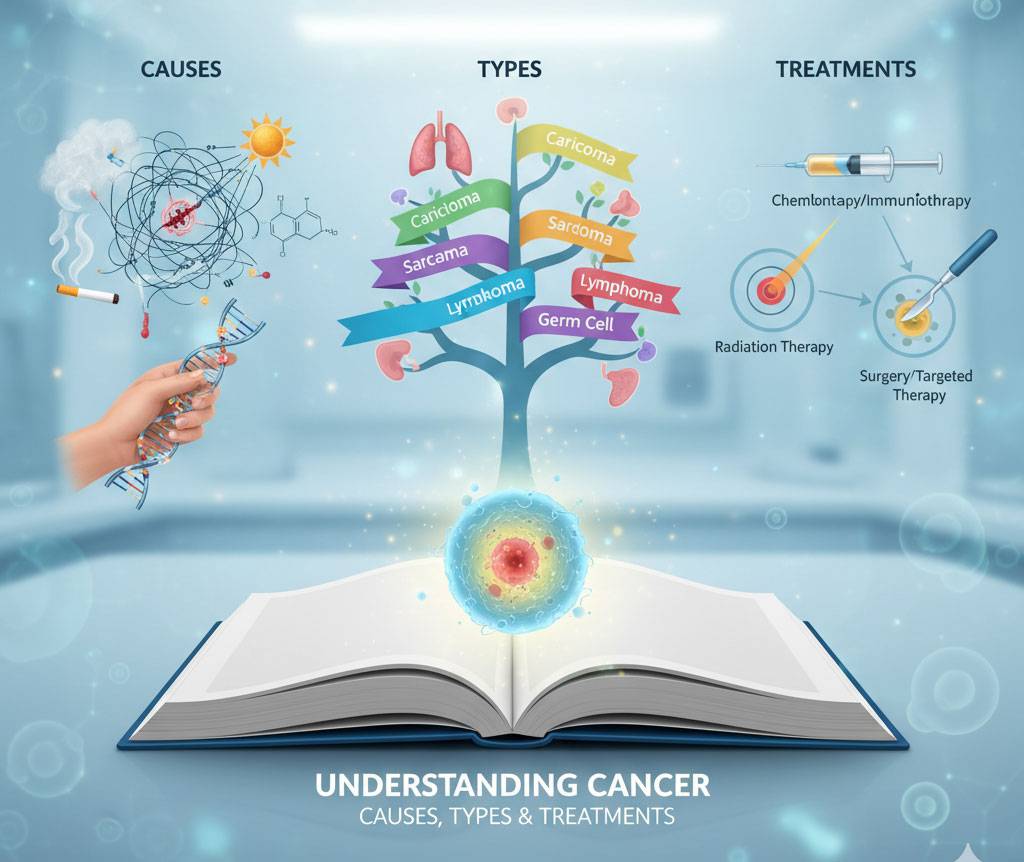Understanding Cancer: Causes, Types & Treatments
Cancer is one of the most complex and challenging diseases known to medicine. It occurs when abnormal cells in the body begin to grow uncontrollably, spreading into surrounding tissues or organs. Unlike normal cells that grow, divide, and die in a regulated process, cancer cells continue dividing even when they’re not needed, forming tumors or invading blood and lymphatic systems.
What Causes Cancer?
Cancer doesn’t have a single cause. Instead, it develops through a combination of genetic, environmental, and lifestyle factors. Some of the most common causes and risk factors include:
- Genetic mutations: Inherited or acquired mutations in specific genes can increase the risk of cancer development.
- Tobacco use: Smoking remains the leading cause of preventable cancers worldwide, including lung, throat, and bladder cancers.
- Radiation exposure: Both ionizing radiation (such as X-rays) and ultraviolet rays from the sun can trigger DNA damage.
- Unhealthy diet and obesity: Diets high in processed foods, red meat, and sugar can increase the risk of various cancers.
- Infections: Certain viruses and bacteria, such as HPV, hepatitis B and C, and H. pylori, are linked to specific types of cancer.
While these risk factors play a major role, it’s important to remember that cancer can also occur in individuals without any identifiable cause, which is why regular medical check-ups are essential.
Common Types of Cancer
There are over 100 different types of cancer, categorized according to where they begin in the body. The most common types include:
- Breast cancer: One of the leading cancers among women, often detected through mammography screening.
- Lung cancer: Frequently associated with smoking but can also occur in non-smokers exposed to environmental pollutants.
- Prostate cancer: Affects men, typically in older age, and is usually found through PSA blood tests.
- Colorectal cancer: Develops in the colon or rectum and often begins as polyps that can turn cancerous.
- Skin cancer: Caused primarily by ultraviolet (UV) radiation from the sun or tanning beds.
Each cancer type behaves differently, and treatment outcomes depend on factors such as early detection, stage, and overall health condition.
How Cancer Is Diagnosed
Early detection is vital to improving cancer survival rates. Diagnosis typically involves several steps, including:
- Medical imaging: MRI, CT, PET, and ultrasound scans help locate abnormal tissue growth.
- Biopsies: A small cell or tissue sample is examined under a microscope to confirm the presence of cancer cells.
- Blood tests: Certain markers or proteins can indicate the possibility of cancer or monitor treatment response.
- Genetic testing: Helps identify hereditary cancer syndromes, allowing targeted monitoring and prevention.
At Liv Hospital, advanced diagnostic tools and multidisciplinary teams work together to ensure early and precise cancer detection.
Modern Cancer Treatment Options
Cancer treatment has evolved dramatically over the past decades. At Liv Hospital’s Cancer Center, patients receive individualized care combining the latest medical technologies and evidence-based therapies. The main approaches include:
- Surgery: Removing the tumor and surrounding tissues, often the first step in treatment.
- Chemotherapy: Using drugs to destroy cancer cells or stop them from dividing.
- Radiation therapy: High-energy radiation targets and kills cancer cells while minimizing damage to healthy tissues.
- Immunotherapy: Boosts the body’s immune system to identify and attack cancer cells.
- Targeted therapy: Uses medications that specifically interfere with molecular mechanisms driving cancer growth.
- Stem cell transplantation: Particularly used in blood-related cancers like leukemia and lymphoma to rebuild bone marrow.
Liv Hospital integrates these treatments through a multidisciplinary oncology board, where experts from surgery, radiology, pathology, and medical oncology collaborate to design the most effective and least invasive treatment strategies for each patient.
Innovative Cancer Care at Liv Hospital
Liv Hospital stands out as one of Turkey’s leading centers for comprehensive cancer care. The hospital combines cutting-edge medical technologies—such as robotic surgery, molecular diagnostics, and precision oncology—with compassionate patient-centered care. International patients benefit from world-class facilities, English-speaking medical staff, and personalized care programs throughout their treatment journey.
The hospital’s approach is based on three key pillars:
- Precision Medicine: Genetic and molecular profiling ensures treatments are tailored to each patient’s unique cancer characteristics.
- Comprehensive Support: Psychological counseling, nutrition guidance, and post-treatment follow-up are integral aspects of holistic care.
- Advanced Infrastructure: Modern cancer treatment units equipped with the latest diagnostic imaging and radiotherapy technology provide safer and more effective results.
Whether for local or international patients, Liv Hospital’s Oncology Department remains committed to offering innovative, ethical, and evidence-based cancer care.
Living Beyond Cancer: Quality of Life After Treatment
Surviving cancer is more than just eliminating the disease—it’s about regaining health, confidence, and emotional well-being. At Liv Hospital, post-treatment rehabilitation programs help patients manage long-term side effects and reintegrate into active life. These programs may include physiotherapy, psychological support, and dietary planning to boost recovery and maintain overall wellness.
Moreover, the hospital emphasizes cancer prevention and awareness through regular public health initiatives, free screening campaigns, and education on risk factor modification. These proactive steps play a crucial role in reducing cancer incidence and improving long-term survival rates.
Final Thoughts
Cancer affects millions of lives worldwide, but with scientific advancements and early detection strategies, more people are living healthier, longer lives after diagnosis. Institutions like Liv Hospital are leading this transformation through innovation, compassion, and personalized care. Whether it’s diagnosis, treatment, or ongoing support, Liv Hospital offers patients every opportunity to overcome cancer and reclaim their quality of life.




